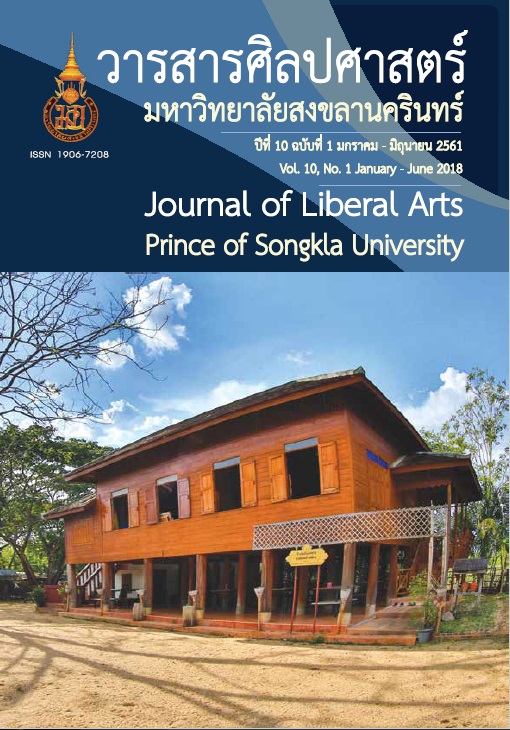Ideologies in the historical novel “Song Fang Khlong”
Keywords:
Conservatism, ideologies, middle-class, New Historicism, Song Fang KhlongAbstract
The aim of this paper is to study V. Vinichaykul’s historical novel “Song Fang Khlong” using the New Historicism and ideology approach to analyze it. The results of the study show that the content of this novel reflects influences of two kinds of ideologies widespread at the time it was written: middle-class ideology and conservatism. The co-existence of these ideologies in the novel, not only reflects the interplay between ideologies when the time the novel was created, but also the nature of literature that is without unity. It is an open area for different concepts and ideologies to continuously strike each other.
References
Aewsriwong, N. (1993). The cultural dimensions of the Thai middle class. In Sungsidh Piriyarangsan and Pasuk Phongpaichi (Editors.). The middle class and Thai democracy. Bangkok: The Political Economy Centre, Faculty of Economics, Chulalongkorn University and Friedrich Ebert Stiftung. [In Thai]
Baker, C. & Phongpaichit, P. (2014). A history of Thailand. Bangkok: Matichon Press. [In Thai]
Bonnycastle, S. (2007). In search of authority: A beginners’ introduction to literary theory. Broadview Press.
Charoenlert, V. (1993). The middle class and May 1992. in Sungsidh Piriyarangsan and Pasuk Phongpaichi. (Editors.). The middle class and Thai democracy. Bangkok: The Political Economy Centre, Faculty of Economics, Chulalongkorn University and Friedrich Ebert Stiftung. [In Thai]
Chotiudompant, S. (2016). Western literary theories in the 20th Century. Bangkok: Chulalongkorn University Press. [In Thai]
Chuanchaiyasitt, P. (1996). Women and the teaching profession in Thai society, 1913-1936. (Master’s thesis). Chulalongkorn University, Bangkok. [In Thai]
Mektrairat, N. (1982). The 1932 Revolution of Siam: Frontiers of knowledge. Thammasat University Journal, 11(2): 7-39. [In Thai]
Phiwnuan, C. (1993). The political thought of the Thai military: 1976-1992. Bangkok: Manager Press. [In Thai]
Phongpaichit, P. (1993). The middle class of Asia NICs and Thailand in Sungsidh Piriyarangsan and Pasuk Phongpaichi (Eds.). The Middle Class and Thai Democracy. Bangkok: The Political Economy Centre, Faculty of Economics, Chulalongkorn University and Friedrich Ebert Stiftung. [In Thai]
Phongpaichit, P. & Baker, C. (1996). Thai economy and society in Bangkok Period. Chiang Mai: Silkworm Books. [In Thai]
Piriyarangsan, Sungsidh and Phongpaichi, Pasuk (Eds.) (1993). The Middle Class and Thai Democracy. Bangkok: The Political Economy Centre, Faculty of Economics, Chulalongkorn University and Friedrich Ebert Stiftung. [In Thai]
Pramoj, K. (1988). Siamrath Newspaper, 23 July 1988, 5. [In Thai]
Prasertkul, S. (1982). Historical necessity of the 24 June 1932 movement. Thammasat University Journal, 11(2), 62-96. [In Thai]
Rattanamongkhonmat, A. & Khatithammanit, W. (2004). Thai people and politics: Blessed or tragic. Bangkok: Institute of Public Policy Studies. [In Thai]
Rungrat, P. (2000). Pak Kai Lai Thong: Collection of interviews and biographies of 15 contemporary popular writers. Bangkok: 99 Publishing. [In Thai]
Thanapornpun, R. (2003). The process of economic policy decision making in Thailand: Historical analysis of political economy: B.E. 2475-2530. Bangkok: Kobfai Publishing Project. [In Thai]
Tumchuchote, P. (2000). An Analysis of V. Vinicchayakul’s Novels: Rattanakosin and Song Fang Khlong. (Master’s thesis). Ramkhamhaeng University, Bangkok. [In Thai]
V. Vinichaykul (2013). Song Fang Khlong. Bangkok: Peuan dee Press.
[In Thai]
V. Vinichaykul (1990). Song Fang Khlong. Nakhon Pathom: Wat Sa Tri.
[In Thai]
Downloads
Published
How to Cite
Issue
Section
License
The authors retain the copyright to their article but the Journal of Liberal Arts, Prince of Songkla University reserves the exclusive rights to first publication.






